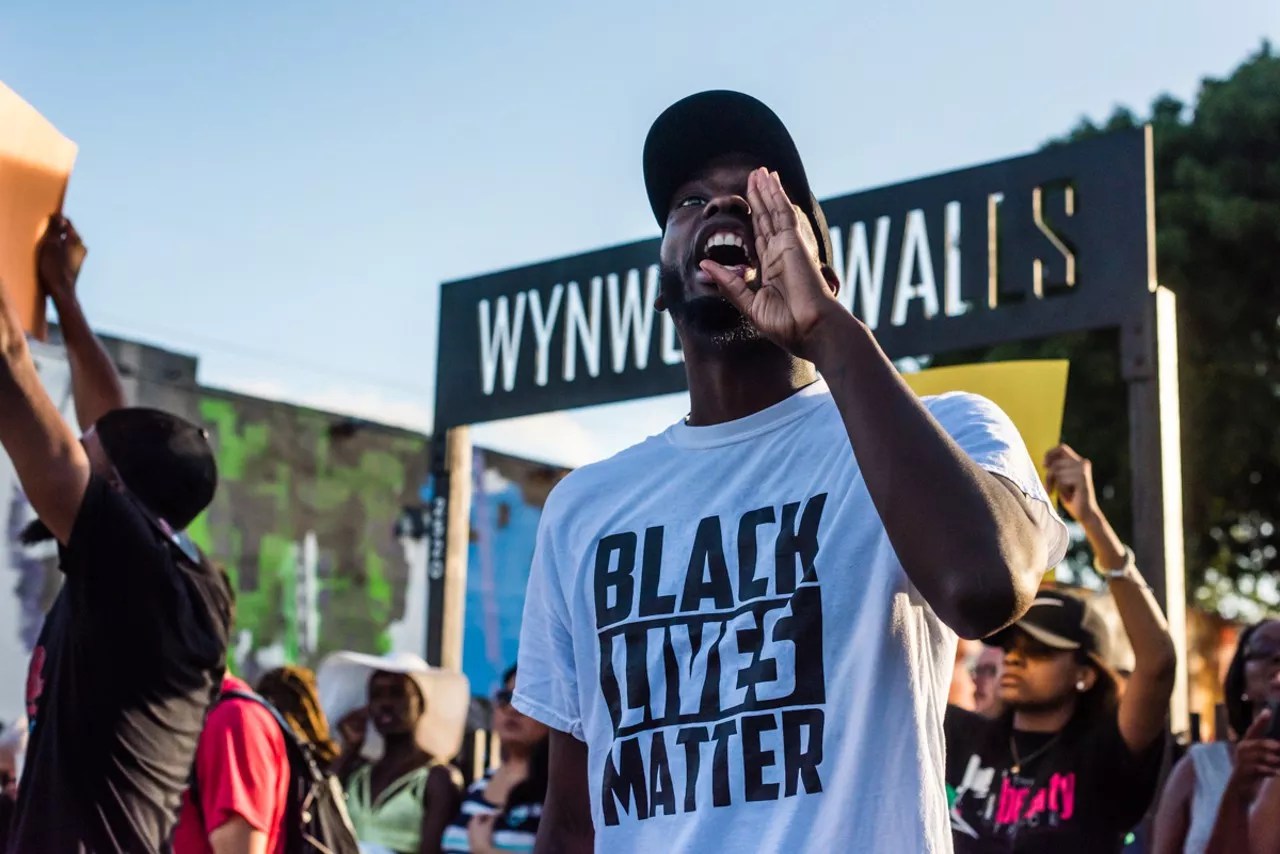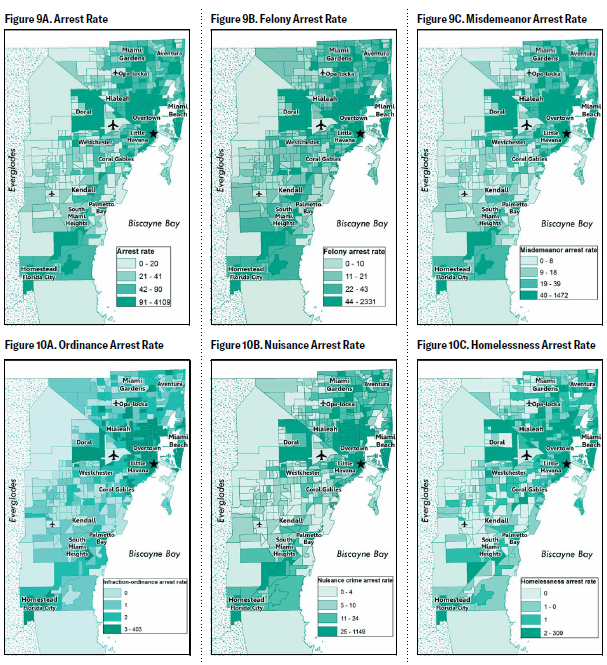
Photo by Karli Evans

Audio By Carbonatix
After analyzing criminal-justice data across Miami-Dade County from 2010 to 2015, the Florida chapter of the American Civil Liberties Union has confirmed something many Miamians of color already suspect: If you’re a black person, especially a black Hispanic, the Dade County criminal-justice system will treat you more harshly than if you’re white.
The ACLU of Florida’s Greater Miami chapter today released a landmark, 52-page report that details the justice disparity between Miami’s black and white residents. Compared to whites, non-Hispanic blacks face 2.2 times greater rates of arrest, 2.3 times greater rates of pretrial detention, 2.5 times greater rates of conviction, and 2.5 times greater rates of incarceration.
The disparity is even worse for black Hispanic Miamians, who, compared to whites, are subject to four times greater rates of arrest, 4.5 times greater rates of pretrial detention, 5.5 times greater rates of conviction, and six times greater rates of incarceration.
“White defendants, whether Hispanic or non-Hispanic, are more likely to be filtered out of the system early through prosecutorial decisions not to file or to reduce or drop charges, resulting in lower rates of conviction and incarceration for white defendants overall relative to black defendants overall,” the report reads. (University of Miami sociologists authored the study on the ACLU’s behalf.)
The ACLU warns that discriminatory policing erodes Miami’s communities of color. When entire neighborhoods and classes of people are subject to constant arrest and police surveillance, the “‘collateral consequences’ of mass incarceration serve to weaken communities with already few resources, further increasing racial and ethnic inequality,” the ACLU writes. “In turn, the destabilization of black neighborhoods because of mass policing and incarceration can actually increase crime in these areas, further perpetuating criminal justice system involvement.”
While the report takes a harsh whack at the 35 police departments in Miami-Dade — the ACLU says cops are clearly patrolling the county’s historically black and poor areas (many of which were created by white landowners decades ago through redlining and discriminatory housing policies) — the data also does not bode well for Miami-Dade State Attorney Katherine Fernandez Rundle, who is tasked with charging and prosecuting people once they’re arrested.
The ACLU says prosecutors arbitrarily treat black defendants far more harshly once they enter Miami-Dade’s justice system. Because black defendants are likelier to be both convicted of crimes and sentenced to longer jail terms, this trend has led to black defendants being overrepresented in the county prison system compared to whites.
“Thus, across multiple stages of the system, black defendants become even more disproportionately overrepresented,” the ACLU notes. “For example, black non-Hispanic defendants increase from about 38 percent of arrestees to 43 percent of those incarcerated, and black Hispanic defendants increase from about 8 percent of arrestees to 12 percent of those incarcerated.”

ACLU of Florida
In contrast, the “opposite is true for white defendants, who tend to be filtered out of the system at a relatively higher rate through no file/no action and
The report adds:
In fact, the greatest changes in charging in the county occur between arrest and filing charges, and they appear to occur in cases with less serious crimes. Additionally, over half of all county arrests are ultimately not prosecuted, suggesting that police are engaging in aggressive tactics resulting in many more arrests than prosecutable offenses.
These findings indicate that prosecutors in Miami-Dade have wide-ranging discretion in filing charges, choosing whether or not to move forward with charges and negotiating pleas later down the line, particularly for lower-level crimes.
In response, the 11th Judicial Circuit of Florida released a statement after this story was initially published. Without apologizing to Dade County’s residents of color, 11th Circuit Chief Judge Bertila Soto said her judges “will study this report and use it to inform our continuing work with the goal of eliminating all racial and ethnic disparities in our criminal justice system.”
State Attorney Rundle, as well, wrote in a news release that, once her team fully reviews the findings, her office will “take the appropriate steps to correct any implicit bias that may be affecting our practice.”
The ACLU notes that arrest rates in Miami-Dade still correspond almost perfectly with neighborhood income levels and racial segregation: Arrest rates in poor, black areas remain higher than those in rich, white sections of town, and the ACLU notes that “police enforcement is concentrated in black communities.”
Arrests for minor infractions like littering or placing belongings on a sidewalk are concentrated heavily inside poor, black neighborhoods — as well as in rapidly gentrifying parts of town, a fact that homeless-rights advocates have long warned is a problem whenever developers come in to revamp a neighborhood. Black defendants are also disproportionately arrested even in majority-white neighborhoods, which the ACLU noted is particularly troubling.
The ACLU’s data is consistent with a large number of studies on the justice system and policing, which note that, nationally, blacks and whites break the law at relatively equal rates, but blacks are the ones who are arrested and charged far more often.
Black defendants in Miami are also less likely to be offered pretrial release programs or probation. The ACLU notes that a person’s likelihood of being offered a way out of jail before trial is significantly correlated with a person’s race and neighborhood. Black defendants who commit crimes in black neighborhoods are much less likely to be offered affordable bail.
The civil rights group also cautions against treating Hispanic residents in Miami-Dade as a monolith when it comes to justice issues. Taken as a whole, Hispanic residents in the county aren’t necessarily treated much worse than whites. But when researchers split the data for black and white Hispanics, they found that the Miami-Dade justice system punishes black Hispanic residents harsher than anyone else in the county.
“In contrast, white Hispanics are underrepresented in the criminal justice system compared with their proportion
of the county population,” the report notes. “This may be because the white Hispanic population represents by far the largest population (nearly 60 percent) in Miami-Dade County and holds significant local economic and political power in the area.”